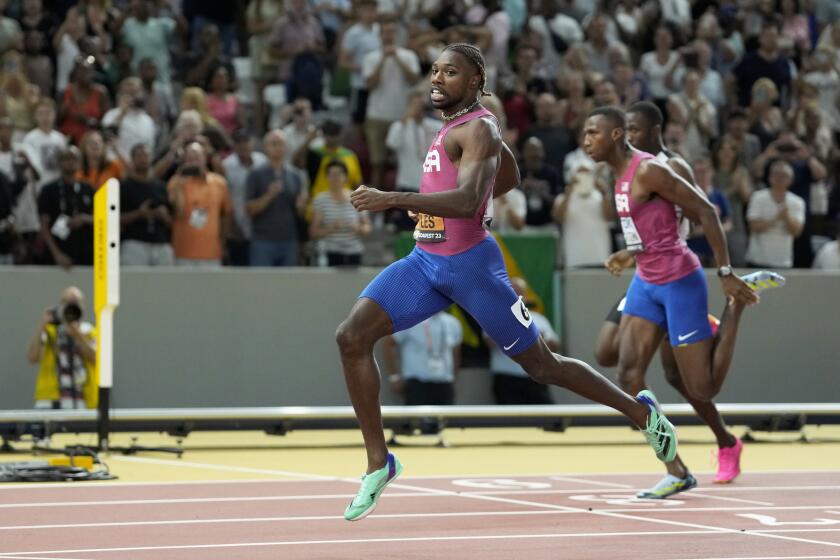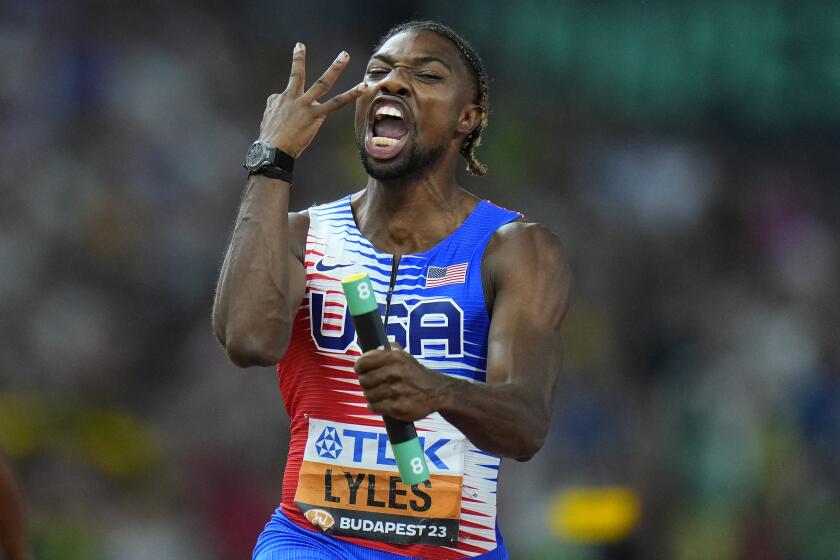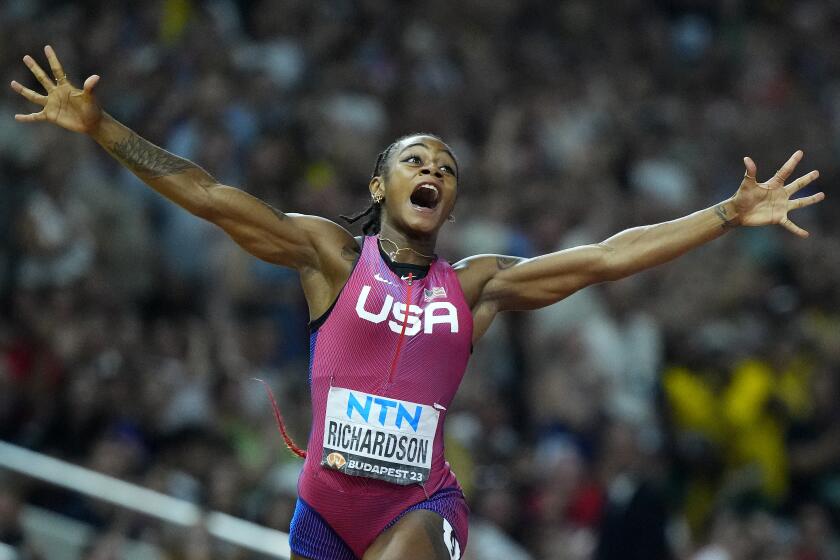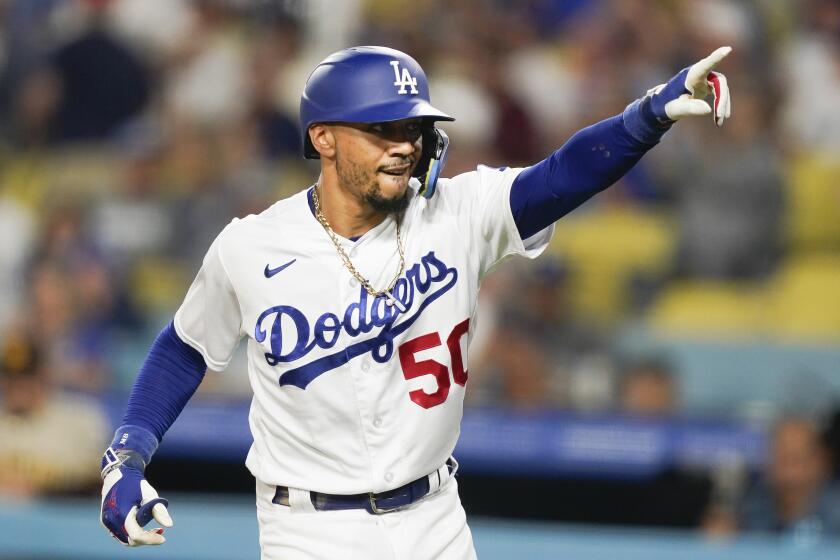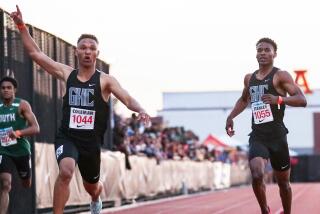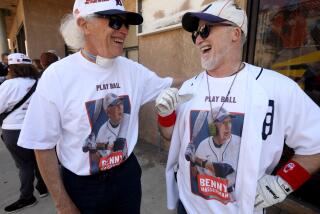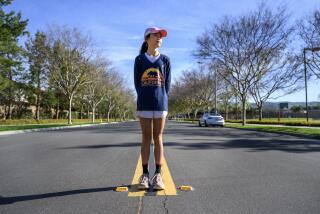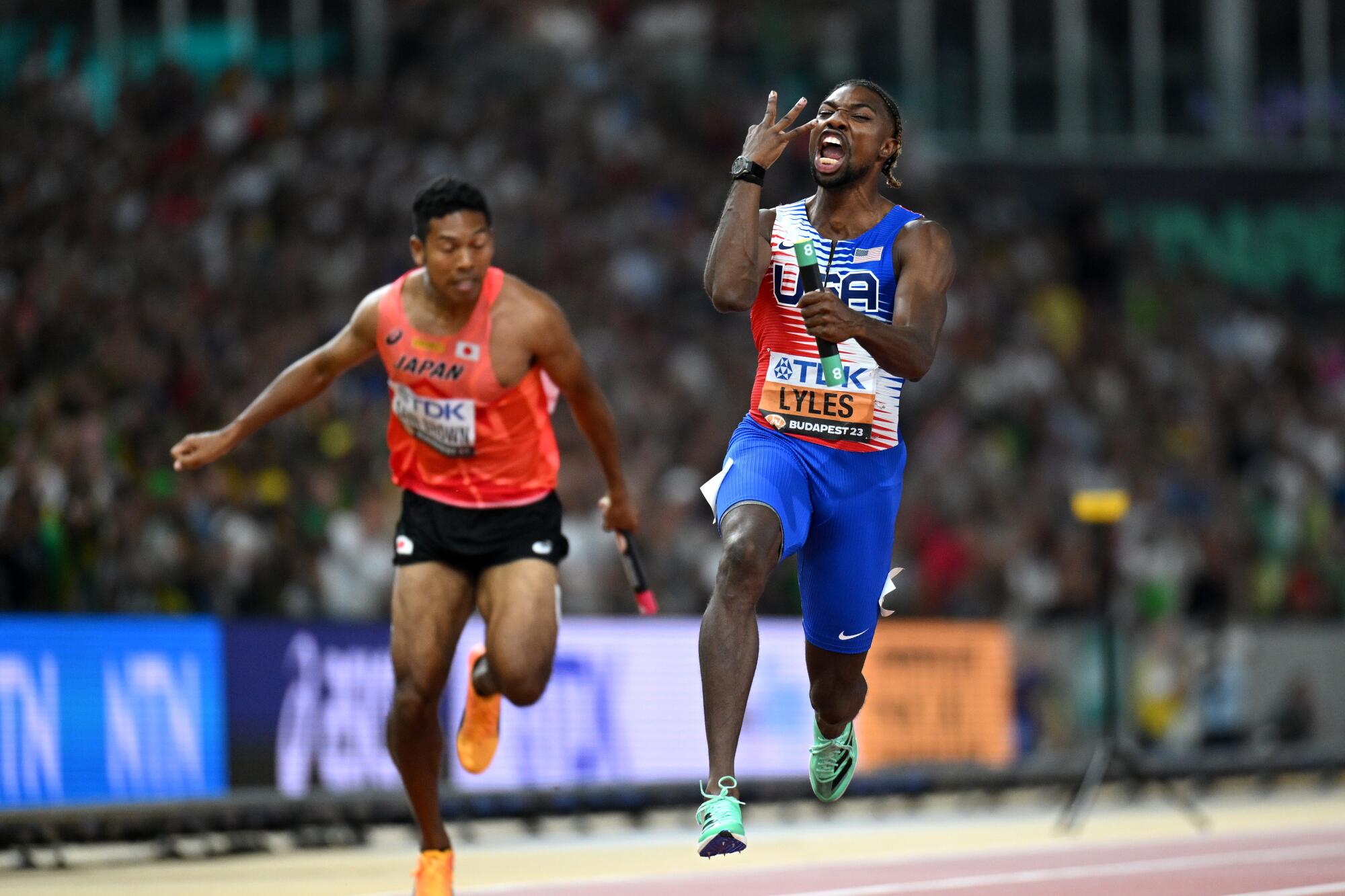
For Noah Lyles, becoming the fastest man in track and field’s fastest race was never the point.
It is the title every sprinter chases. But for Lyles, never the entire ambition.
When he and his brother, Josephus, another decorated sprinter who is one year younger, arrived in the summer of 2016 for a meeting with their agent, Mark Wetmore, sprinting was in a transitional moment. Usain Bolt, whose world-record times in the 100 and 200 meters made him known the world over, was weeks from racing in his final Olympics. Lyles, 19 at the time and only weeks from turning professional right out of high school, left no questions about what would drive his own career: Not only chase the accomplishments of an icon like Bolt, but equal his household-name status.
“We were explaining what our goals were and were like, ‘We want to transcend the sport,’” Lyles said this spring. “It wasn’t, ‘We want to break the world record.’ It wasn’t, ‘We want to have the most world championship or Olympic medals.’ It was, ‘We want to transcend the sport.’
Here are nine questions that were answered at the World Athletics Championships in Budapest as the 11-month countdown begins to 2024 Paris Olympics.
“We want to be those athletes that were known as, ‘They got out of track and field, they just became known. They became household names. They broke the box and now people are struggling to put it back together, and we’ve got to create bigger ones.’ So this was truthfully always my goal.”
When Lyles competes at his season-ending Prefontaine Classic in Eugene, Ore., this weekend, he will do so with evidence his plan is falling into place.
He has the world medals. The 26-year-old last month became the first man since Bolt, in 2016, to win the 100 and 200 meters at either the world championships or Olympics, track and field’s highest stages. He added a third gold by anchoring the U.S. men’s 4x100-meter relay.
He also has commanded the world’s attention like few in track and field can. One documentary series focusing on his life has already aired; two more are in production. When he criticized NBA teams last month for calling themselves “world champions” when they don’t play teams from outside North America, it drew a pointed reaction from NBA stars, Drake and a verbal dressing-down from ESPN’s most visible commentator, Stephen A. Smith. Yet Smith later apologized for calling Lyles “ignorant” and former NBA most valuable player Giannis Antetokounmpo has sided with Lyles’ opinion.
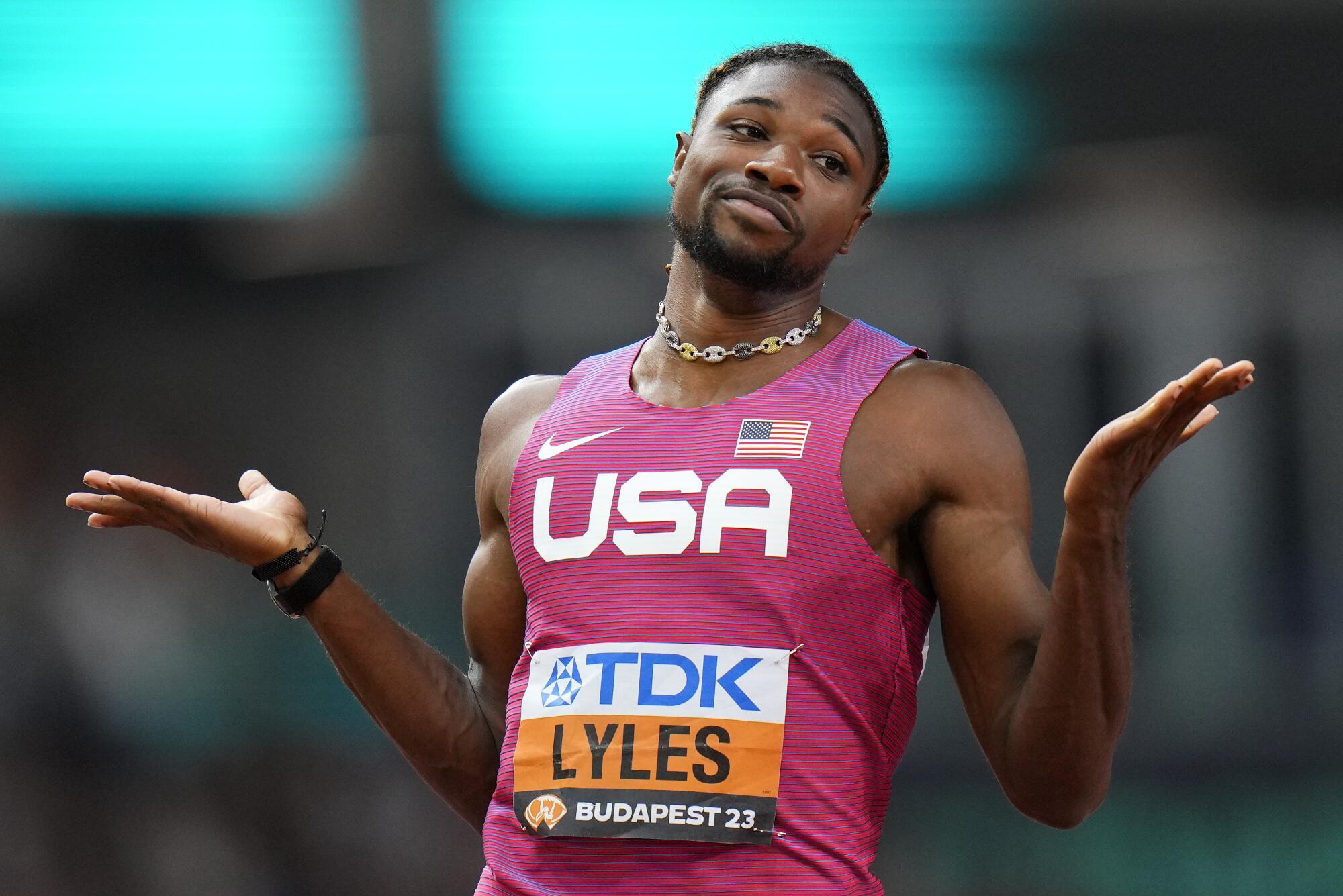
Since Lyles returned to Florida, where he trains, the newfound recognition from strangers who call him by name has interrupted trips to buy hair products and fix his phone. Lyles particularly loved the story his mother told him about a family acquaintance who was watching television in August when a chyron flashed across the screen notifying viewers Lyles had won his third consecutive world championship in the 200.
“They’re interrupting normal TV for this,” Lyles said. “I’m like, ‘Wow, I’m an alert now.’”
In recent years, as Lyles’ accomplishments have given his voice more credibility within the sport, his goals have broadened beyond personal ambition alone. He still wants to be the fastest man within his sport and still wants to be a cultural figure not solely defined by it. But in multiple interviews with The Times this season, he reiterated his desire to change it too, using his growing visibility to leverage new ideas.
Lyles’ therapist recently told him he must find time to celebrate his golden moment in Budapest, but Lyles conceded he has yet to allow himself to take in his achievements, or where they place him in sprinting history. There is still much more on his mind he wants the world to know.
“Me and Mark will get on a phone call every other day and just talk about all the things we want to add, all the things we want to change, everything that we can do,” Lyles said. “What is in our power? What will we have to wait longer for?”
There are mornings when Lyles will wake at 4 and can’t fall back asleep. He’ll kill time by thinking about League of Legends, the battle-filled online video game he plays. The rest of his day, he said, is spent thinking about the state of track and field.
“To be honest, it’s fun to me, because it’s a problem,” he said. “And I like solving problems.”
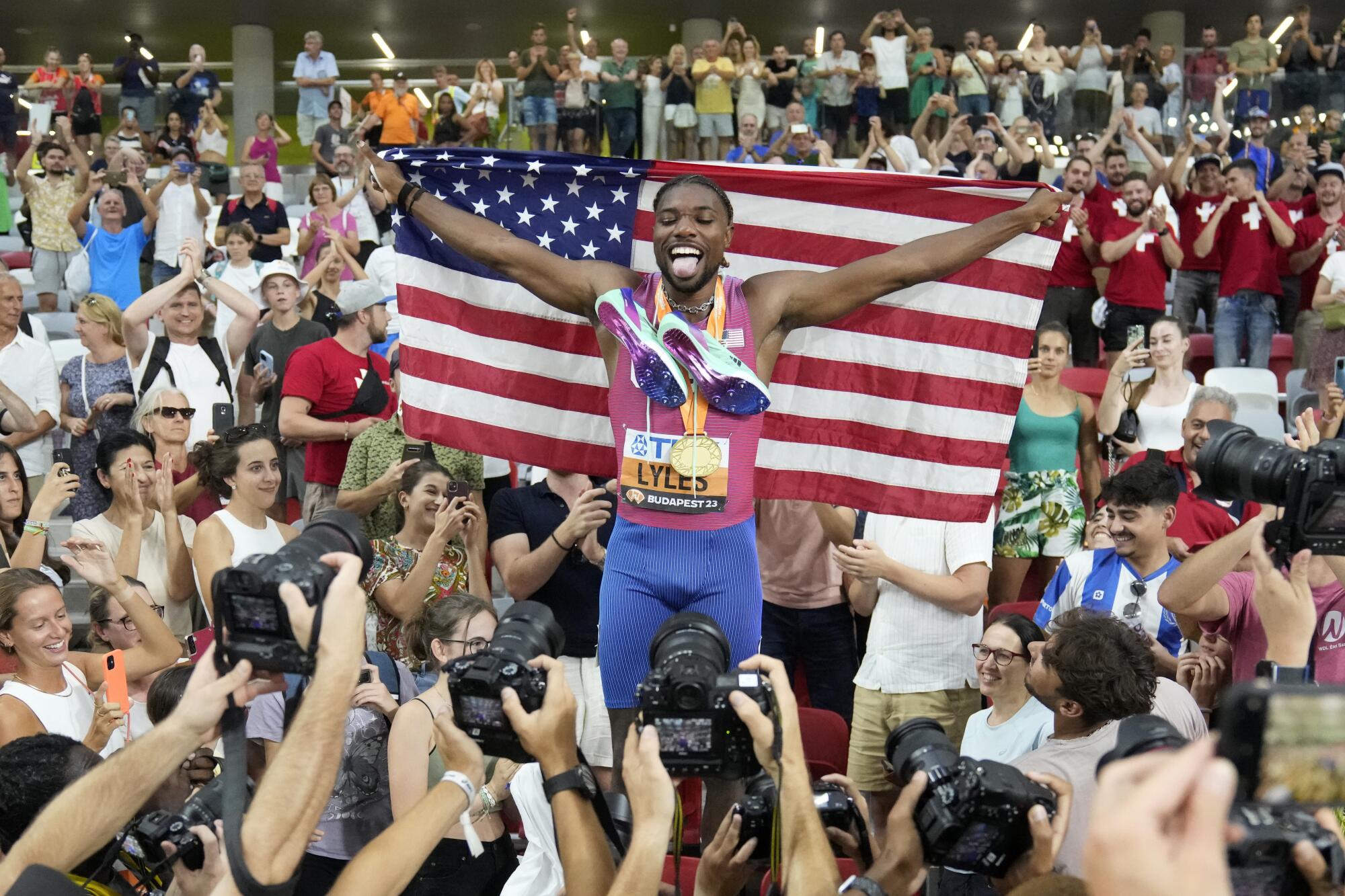
“People say, you know, ‘You’re the face of the sport.’ I’m just like, great; I’m the face of the sport, but is the sport going to come with me?”
— Noah Lyles, on the uncertain business of international track and field
Track’s proponents and critics alike bemoan the difficulty of marketing it to casual fans. There is its wide range of sprints, distances races, jumps and throws. Following a favorite athlete’s season isn’t straightforward. Although track’s most prestigious competition circuit, the Diamond League, has an established calendar of meets from May to September, athletes could drop into any number of the hundreds of competitions hosted across the country or world through the spring and summer. Fans buying tickets often don’t know what they will see: top athletes rarely race head-to-head and can withdraw from meets on short notice.
But its age-old, existential problem is why a sport with the most participants at the U.S. high-school level struggles to grow its attendance and sponsorship in the United States.
World Athletics, the sport’s global governing body, and USA Track & Field, which oversees everything from coaching and officials’ certifications to competitions at the youth to masters levels, believe its future hinges in part on finding the answer. They consider the years leading up to the 2028 Summer Olympics in Los Angeles a critical window to reach its goal of becoming the fifth-most-followed sport in this country.
“Global championships, whether it’s Olympics or world championships, it’s fairly healthy,” said Michael Johnson, the former 200- and 400-meter sprinter who won 12 gold medals at such championships during his career. “But professional track is where the problem is. That’s on life support. ... We’ve been saying this about professional track since I was competing.”
Lyles isn’t so naive as to think one sprinter will untangle years of intertwined frustrations. Yet he wonders whether fresh ideas are being considered by the sport’s decision-makers.
Inspired by seeing NBA players’ pregame outfits spread across social media, and into the pages of high-fashion magazines, Lyles wanted track, an individual sport, to better market its athletes as individuals and one day see themselves, too, in the pages of GQ. When he felt his efforts to publicize athletes’ “walk-ins” at meets brought more resistance than enthusiasm from executives, he asked his agent, Wetmore, to set up space for cameras at a February indoor meet organized by Wetmore.
U.S. sprinter Noah Lyles used his podium after winning three golds at the world track and field championships to mock the practice of calling NBA Finals winners world champions.
Lyles wore a shirt and tie with a matching black Prada jacket and bag and “it got almost as much engagement on my outfit for the track meet as it did when I won the track meet,” Lyles said.
Within months, organizers at the U.S. championships had employees with cameras waiting on the curb outside the University of Oregon’s Hayward Field. By September, GQ requested an interview.
The experience told Lyles a demand for such content existed and that agitating for future changes would again require him to take initiative. It recalled Lyles’ response to disappointment there weren’t more media opportunities following the 2022 world championships: He started his own all-access YouTube series.
“How can we elevate the sport if we’re not meeting the other side where it is?” he asked.
Like several other top athletes, agents and meet promoters, Lyles believes a critical step is drawing a clear line between who is professional and who is not. The distinction that has proven elusive for decades in part because few agree who should ultimately have the power to draw it. Lyles doesn’t begrudge the top college and high school athletes who compete in elite races, but he doesn’t like that it affords fewer opportunities for those with contracts.
All of it was why in March, Lyles said he believed track’s “business is dying.” Asked this month whether that is still his impression, he said his thinking has evolved, but his concern remains the same. While he does not believe the sport itself — which has established fan support in Europe and saw near-sellout crowds fill the world championships in Budapest — is dying, “I’ve now come to the conclusion that there is no business,” he said.
“Yes, I still believe that there needs to be a line and that we are not professional and the more I look up the chain of command, the more I realize that this is not run as a business,” Lyles said. “It is truly a nonprofit and it’s run like one.”
One idea shared by Lyles would follow international open-wheel auto racing’s ladder model, with Formula One at the top for the elite racers and lower classifications beneath it for those coming up the ranks. In track and field’s version, Lyles imagined a certain number of athletes who meet a certain criteria in each event comprising the top professional tier. They would receive spots in the fields of the most prestigious meets and the most lucrative payouts.
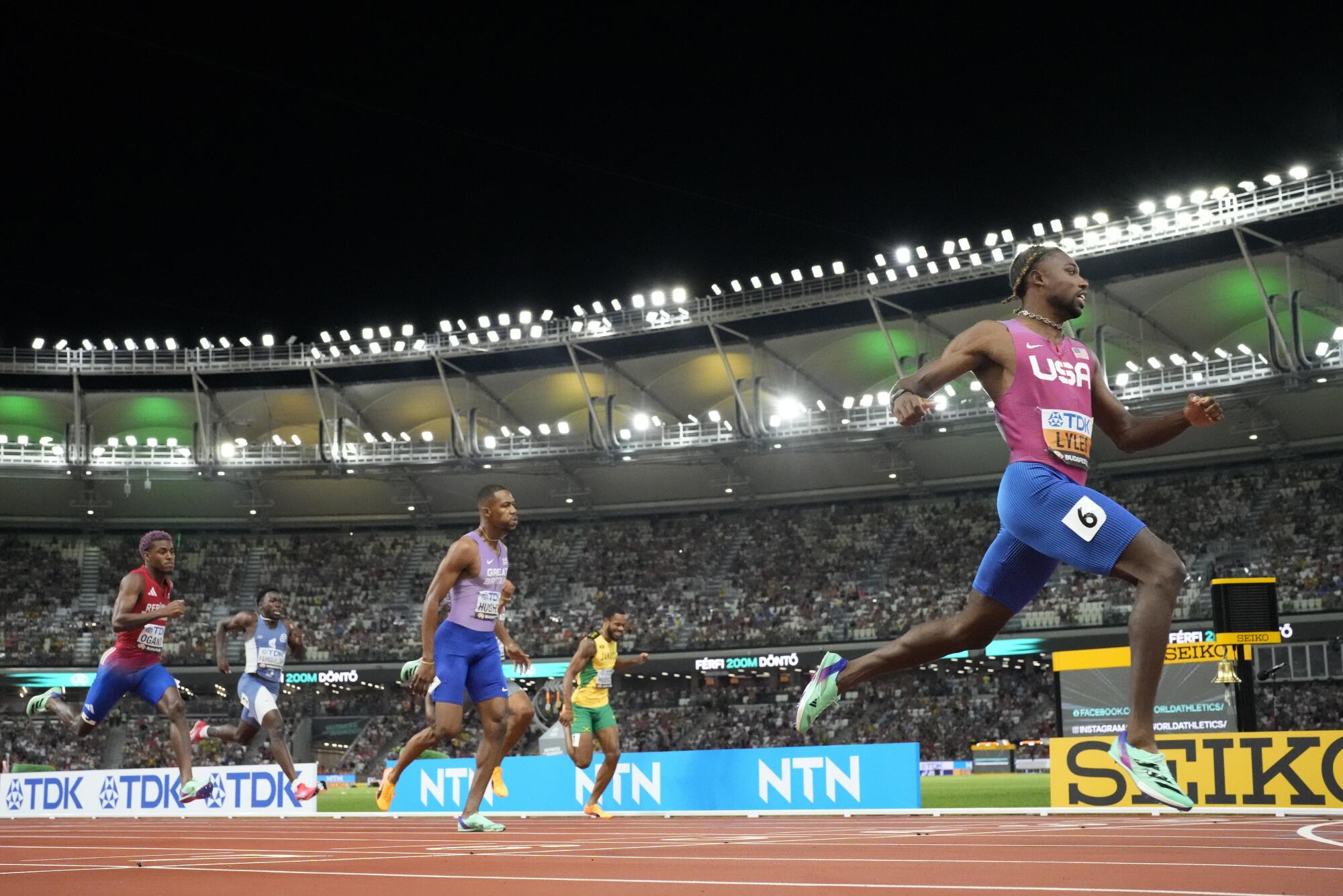
“We were in the age of Usain Bolt for a long time, and if I’m being honest, the most famous track athlete in the world today, it might still be Usain Bolt. I think Noah’s doing his best to change that.”
— Jack Felling, a vice president and coordinating producer of original content for NBC Sports
Whatever the specifics, they would be subject to fierce debate, a point underscored to Lyles when he attended a July athletes-only meeting called by sprinter Sha’Carri Richardson during the U.S. championships. Richardson wanted to discuss the creation of the first track union in the U.S., one that would “build us up as athletes and build up the sport in the United States,” she said in an Instagram post advertising the meeting, “and not continue to just exploit us like these organizations that are supposed to be on our side are doing.”
Lyles attended to hear new ideas. He left feeling the sport’s top earners, middle class and striving class of those who are either searching for or barely holding onto sponsorship weren’t yet aligned on wanting the same things. Yet what isn’t a question, Lyles said, is that overall “especially in the athlete side, they want change” in some form or fashion — and that by leveraging his visibility entering the 2024 Olympics in Paris, his credentials and comfort as a self-styled showman could make him the right voice to spearhead it.
Consistent world medalists “are usually the only people who can speak out and say something a little wild and keep going and get away with it,” he said. Breaking Johnson’s U.S. record from 1996 in the 200 meters last year and winning three world titles in Budapest had only served to deepen Lyles’ security in challenging norms — so long as he knows he is pushing for something wanted by a majority of athletes.
“People say, you know, ‘You’re the face of the sport.’ I’m just like, great; I’m the face of the sport, but is the sport going to come with me?” he said. “... I need the whole body to move in the same ideal that I’m trying to bring everybody with. And it’s not an overnight thing.”
Sha’Carri Richardson won the 100-meter title at the world championships, but it didn’t set in until she saw her time — a meet-record 10.65 seconds.
His brother, Josephus, traced the urge to question what is best to their childhood, and the influence of their mother, Keisha Caine Bishop. A two-time NCAA national champion sprinter at Seton Hall, Caine Bishop “was always big on us thinking critically,” Josephus said. The family first lived in Florida but moved often throughout the Southeast, which gave the Lyles siblings different perspectives and exposure to “OK, things don’t have to be the way they are,” he said.
“I think that Noah is a good person for us to start with because he’s at the top right now so he has a lot of pull,” Josephus said. “If someone at the top has the same ideas as me, it kind of starts a domino effect.
“I think that’s really good. It’s good for the sport, good for the people.”
The situation feels familiar for Johnson, who even at the height of his fame at the 1996 Olympics envied the way his friends playing in the NFL were appreciated outside their sport.
In retirement, Johnson sees in Lyles someone who “gets it,” sharing both his top-end speed and frustrations.
The most popular athletes, musicians and entertainers “get great notoriety and appreciation for ‘You’re one of the best ever,’ recognition for that by a wider public or media, but in this sport, you don’t,” Johnson said. “And I think Noah recognizes that and realizes that, well, he certainly wants it to change.
“But he realizes that I’m only going to get that if I do it myself. My sport isn’t going to do that for me.”
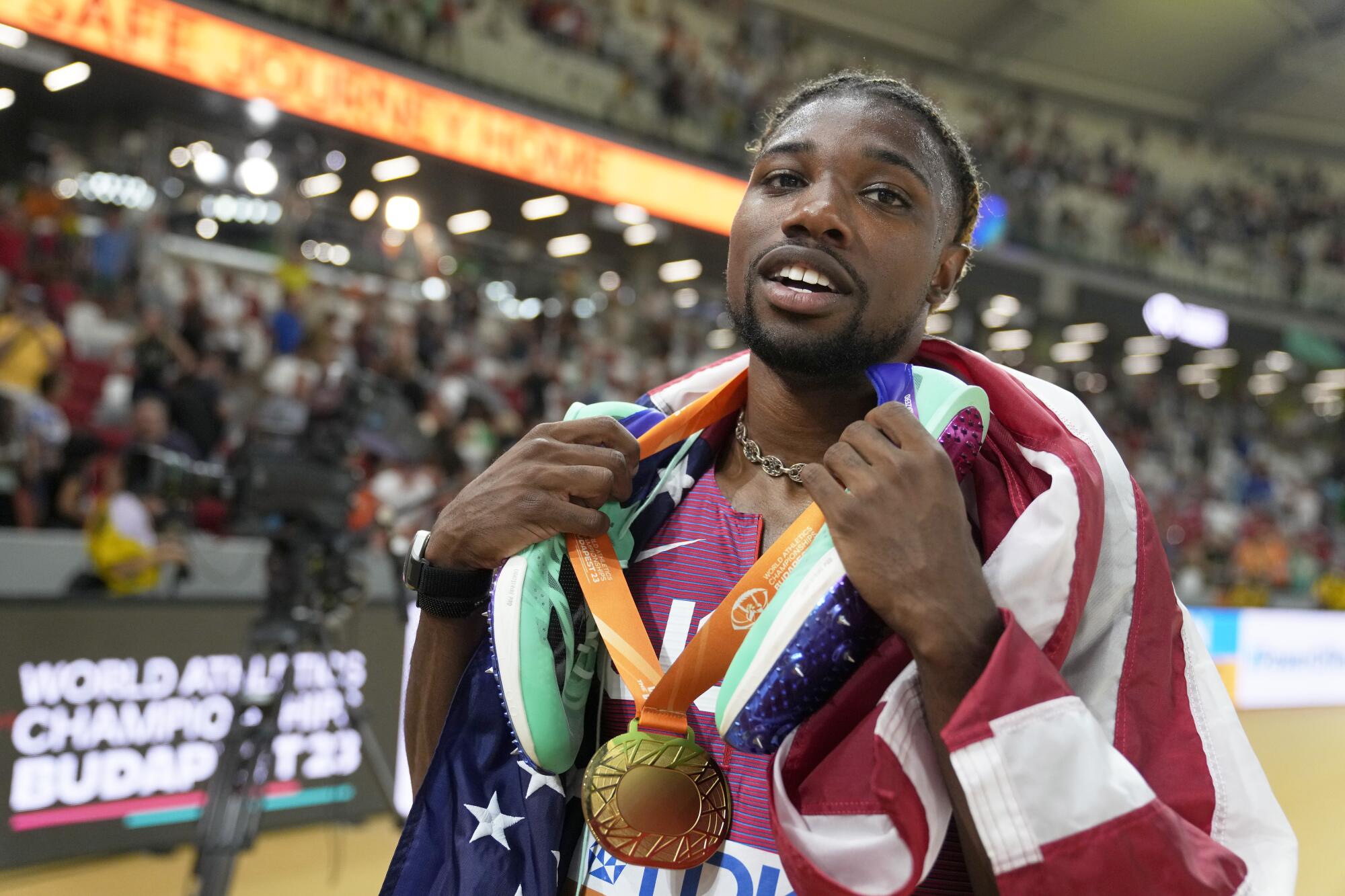
Before Lyles, wittingly or not, took on the NBA last month, his most-shared moment from the world championships came when he didn’t open his mouth at all.
Accepting his gold medal for his first 100-meter title at either a world championship or Olympics, tears rolled down his face.
“I guess I just never realized how much pressure I was really taking on because I’ve never felt like that much until it actually all happened,” he said. “One moment you’re just singing the pledge of allegiance in your head, and all of a sudden you got a tear in your eye and you can’t see the flag too well and you’ve got snot coming down your nose.
“... I think that goes to show how relieved I was to actually grab it. Here I was with the medal in my hand and it’s one thing to tell everybody that you’re the fastest man in the world and they’re like ‘Well, OK, but you’re not a 100-meter runner.’ Every time it’s like, you just wait, you just wait. Now, the moment is finally here.”
The moment was captured by NBC cameras producing “Untitled: The Noah Lyles Project,” a docuseries about Lyles’ upbringing and career that followed him throughout the season, an idea proposed to NBC by Lyles’ management team. The first episode aired on the streaming service Peacock in August, and the second and final episode, which followed him throughout Budapest, debuts this weekend.
Ronald Acuña Jr. has put up great numbers, but MVP favorite Mookie Betts’ stats are better and his versatility is critical to the Dodgers’ success.
The series’ first scene shows Lyles meeting with his mental health coach. Lyles has credited using a therapist for helping him manage feelings of depression that followed him home from the Tokyo Olympics, where he earned a disappointing bronze in the 200. The combination of confidence and vulnerability made Lyles appealing, said Jack Felling, a vice president and coordinating producer of original content for NBC Sports.
“We were in the age of Usain Bolt for a long time, and if I’m being honest, the most famous track athlete in the world today, it might still be Usain Bolt,” Felling said. “I think Noah’s doing his best to change that. He absolutely is a showman, he does want to grow the sport.”
A documentary following the world’s top sprinters, including Lyles, is bound for Netflix next year. Track and field officials are hopeful it will boost the sport much the way Formula One’s domestic popularity skyrocketed in the wake of a Netflix series made by the same production company. Another series with Lyles as a main character is in the works, as well. If Lyles qualifies for next summer’s Olympics, as expected, few U.S. athletes will have as much mainstream exposure.
The combined effect will mean more people than ever will judge whether Lyles can live up to his own expectations for 2024.
“Win everything,” he said. “100, 200, 4-by-1 [relay]. Get an Emmy for best docu-series. Walk in the Met Gala. Go on every late-night show because hopefully the strike will be over and the writers will get what they need.”
A few tenths of a second stand between Lyles and what he still needs. He is 0.13 from breaking Bolt’s world record of 19.19 seconds in the 200.
Bolt’s world record in the 100 is 9.58. In December, Lyles said that he has dreamed since high school of running 9.41. Before August’s world championships, he posted a bold prediction on Instagram, that he would run 9.65 and 19.10. When those times didn’t materialize, and when he criticized NBA teams for calling themselves champions of the world, he found himself in a spotlight of his own making. He doesn’t regret what he has said, nor the attention that has come with it, but said he does ask himself at times whether his intended message is getting across.
“Let me just say that on my Twitter drafts, there are a lot of drafts,” he said, his smile widening.
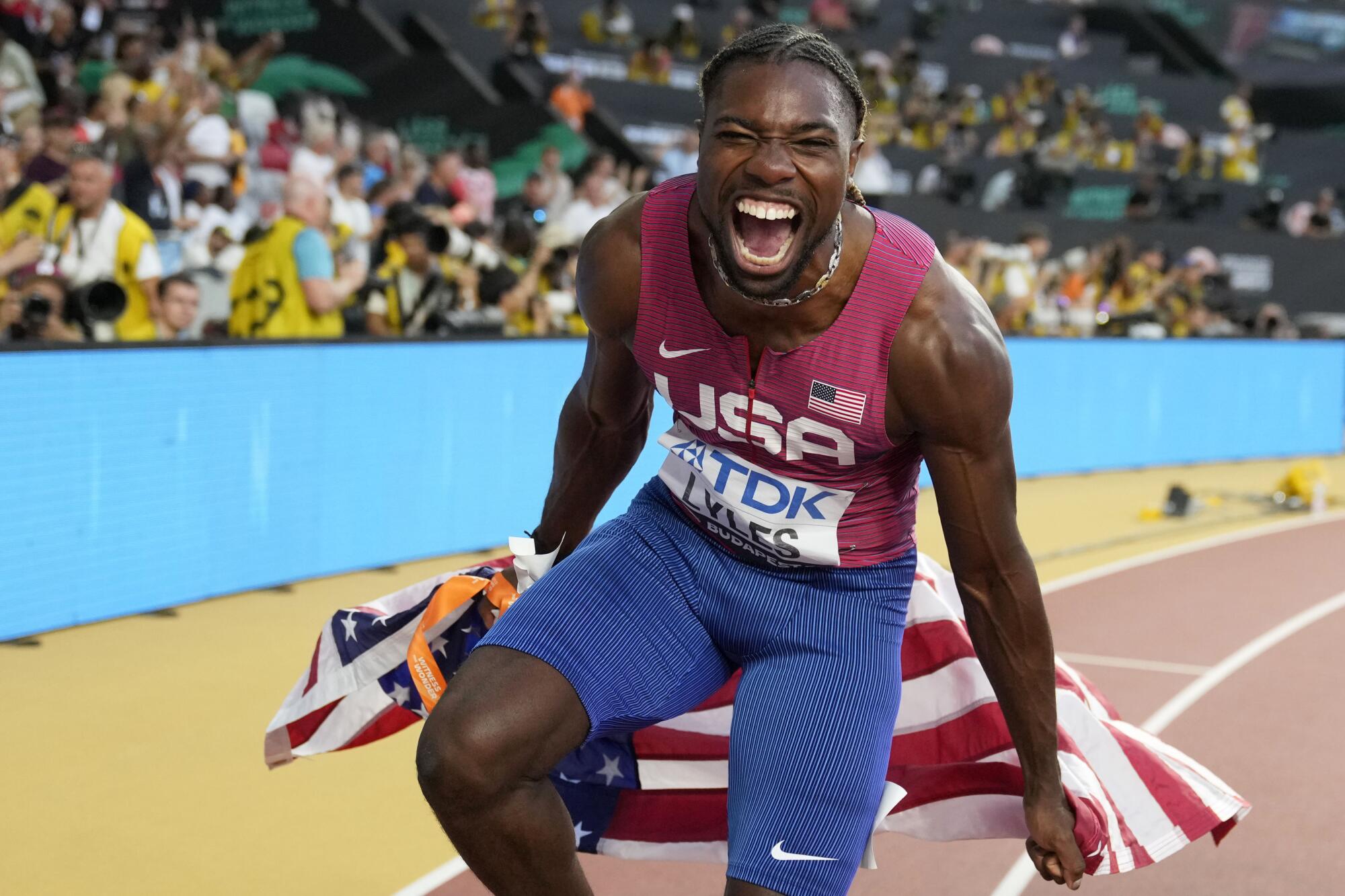
“I’m going to always throw up my goals, because no matter if people believe it or not, I believe in myself,” he said. “And there’s some point in me that I believe that I have to say my goals and let them be known for me to go out there and achieve them because even if I don’t, I will force myself to walk towards it.”
At the very least, he believes a new audience will know who he is and what he wants.
On June 3, after Lyles easily won a 200 in Kingston, Jamaica, the man whose records and global-icon status Lyles chases strided over and slapped hands with him. Bolt leaned close to Lyles’ ear to be heard above the crowd as NBC’s cameras rolled on what Felling called an unplanned interaction.
“Let me say something,” Bolt said, as caught by the microphone. “Keep your same attitude.”
“Appreciate it,” Lyles said.
“No,” Bolt said. “The sport needs that s—. We need a personality. All right?”
More to Read
Go beyond the scoreboard
Get the latest on L.A.'s teams in the daily Sports Report newsletter.
You may occasionally receive promotional content from the Los Angeles Times.

